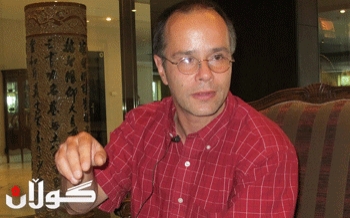David Romano: It would be wise for the KRG to maintain good relations with Saudi Arabia and the Gulf Arab states
December 27, 2015
Exclusive Interviews

Romano: I agree, but the problem is that no one knows what "acting more responsibly" means. If the United States stops supporting the rebels -- including the Syrian Kurds -- ISIS or Assad could win the conflict. If Russia stops supporting Assad, ISIS or other rebels could win the conflict. If ISIS or other Islamists prevail, there could be an epic massacre of Alaawis, Christians, Druze and Kurds.
Gulan: Right now the fight against Islamic State entered a new phase; this organization has proved that it constitutes a serious global threat that requires a global response. So, how the strategy for weakening and destroying the Islamic state should be developed in order to be up to the task?
Romano: The United States and Russia should support the PYD-led Syrian Democratic Forces (SDF) and the establishment of more cantons, where neither Assad nor Jihadis will have control. These can serve as safe havens to stem the flow of refugees and calm the conflict in order to pave the way for a political settlement. Turkey will have to be clearly told not to intervene as the SDF advances West of the Euphrates River. In the south, moderate rebels can emulate the SDF cantons as well, with support from the U.S. and Jordan. Damascus, Latakia and a few other areas would effectively become cantons under Assad's control.
In Iraq, the Peshmerga and Sunni Arab groups cooperating with the KRG should be supported at the same time that military aid to Baghdad ceases. The Shiite militias have proven too radical and dangerous to continue supporting Baghdad militarily. This may lead to the break-up of Iraq, of course, but this is preferable to a radical Shiite-militia controlled dictatorship in Baghdad trying to impose itself on the rest of the country.
Gulan: There is consensus among scholars that ISIS the manifestation of deeper structural problems in this region, and the peoples of regions are stuck between a deeply dysfunctional states and sectarian violent and radical religious movements, what are the possibilities of emerging different types and colors of radical religious trends in the future in the case of failure of addressing the root causes of the problems?
Romano: The region will see more groups like ISIS. Each needs to be crushed at the same time that legitimate, more liberal states and governments truly reflective of their populations are supported. As each jihadi movement is crushed, the mad dreams of the extremists will wane. All of this will take time and effort.
Gulan: Some propose that in order to persuade the Sunnis to rise against ISIS and the Sunni states to actively engage in combating ISIS, they have to have a greater stake of the outcome of the fight, meaning that a Sunni state has to be crated for Sunnis in the ISIS controlled territories in both Iraq and Syria, to what extent this is a realistic, and viable option?
Romano: This is what ISIS has attempted to do, with some success. After crushing ISIS' attempt, a more moderate Sunni autonomous region or even state could be carved out of the area. Sunnis themselves must be consulted on this following the defeat of ISIS, since they are the ones principally affected by the proposal.
Gulan: Liberating Sinjar marked a significant development in the fight against ISIS, it showed that the aura of invincibility of this organization can be punctured, how do you see the implications of this victory and do you agree that international strategy against ISIS gained momentum after this battle?
Romano: A "Kurdish-centric strategy" is steadily, and finally, gaining favor in the West as a result of the liberation of Sinjar, Kobane and Tal Abyad. More and better support for the Kurds in Iraq and Syria now appears to be on the way. The Kurds themselves could accelerate this process if they could further democratize their institutions and put aside their internal rivalries.
Gulan: The Kurds in Iraq claim that the process for gaining independent state has already started, because, they no longer want to be attached to this dysfunctional state, and pay the price for the failure of Iraqi government. On the other side the Kurds have demonstrated that they are committed and capable actor for fighting terrorism and to govern themselves effectively. So what should the Kurds do to gain international support and recognition in case of declaring an independent state?
Romano: They need to keep doing what they have been doing -- protecting minorities like the Yezidis and the Christians as well as not committing human rights abuses against Arabs, hosting refugees and demonstrating that they are responsible, ethical and democratic actors. At some point soon, however, the Kurds of Iraq will probably just have to jump and declare their statehood, presenting the international community and the region with a fait accompli that they must accept, lest the campaign against ISIS collapse for lack of effective local proxies on the ground. With Turkey needing the Kurdistan Region of Iraq for gas and oil supplies even more following problems with Russia, Ankara's crucial consent for such a declaration is probably more possible than ever.
Gulan: The president Massoud Barzani paid a high-profile visit to Saudi Arabia, and warmly welcomed by the King Salman, according to the media reports they discussed issues of mutual concern. How do you see the significance of this visit and the prospects of enhancing future bilateral relations, and what is the important of Gulf States and Saudi Arabia particularly, for Kurdistan region?
Romano: It would be wise for the KRG to maintain good relations with Saudi Arabia and the Gulf Arab states, but they cannot become too close because Iran is always next door to Kurdistan. Relations between all these actors must be balanced carefully.















